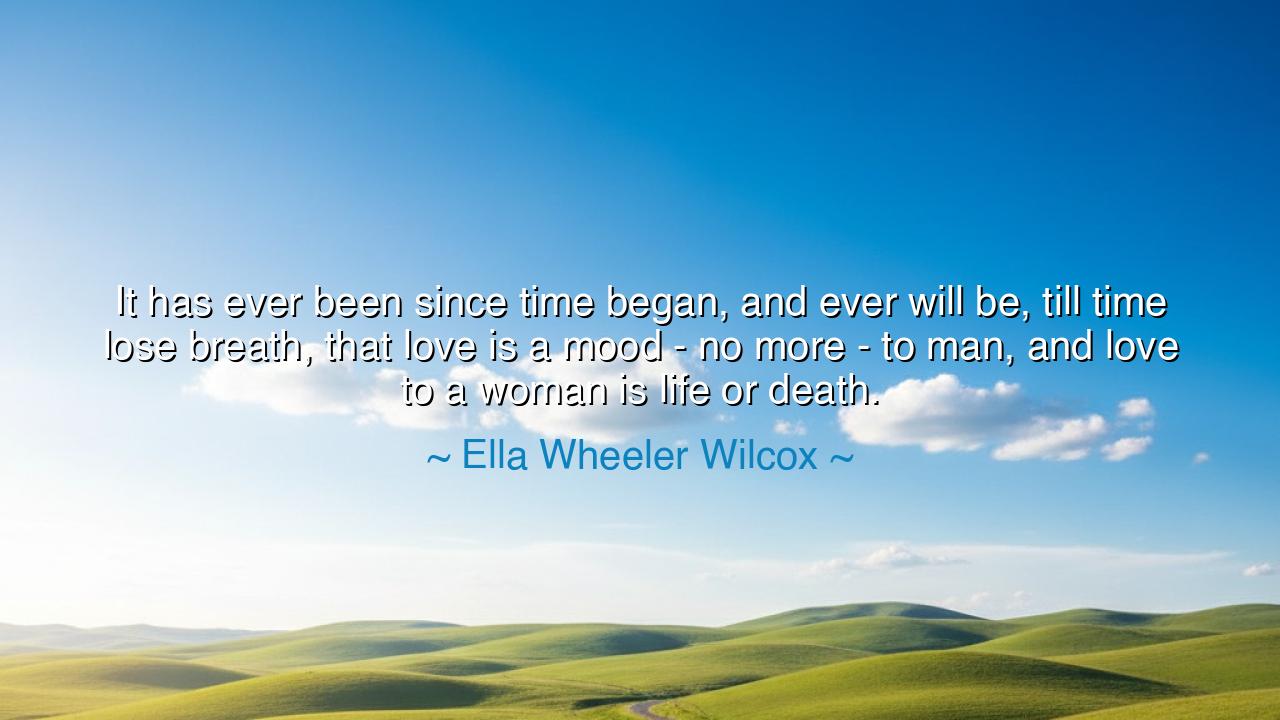
It has ever been since time began, and ever will be, till time
It has ever been since time began, and ever will be, till time lose breath, that love is a mood - no more - to man, and love to a woman is life or death.






The words of Ella Wheeler Wilcox — “It has ever been since time began, and ever will be, till time lose breath, that love is a mood — no more — to man, and love to a woman is life or death.” — flow like an ancient river, carrying within them both tenderness and truth. They speak not only of love, but of the eternal imbalance that has haunted human hearts since the dawn of desire. In her voice, we hear not accusation but observation — the quiet, sorrowful wisdom of one who has watched how differently men and women are shaped by love. To the man, she says, love often comes as a mood, a passing flame, bright yet fleeting; but to the woman, love is life or death, an ocean in which she gives herself wholly, body and soul.
In the age of Ella Wheeler Wilcox, the late nineteenth and early twentieth centuries, women were taught that love was their purpose, their salvation, their destiny. Society demanded that they pour their entire existence into the devotion of another — that their honor, joy, and even identity rest upon the constancy of affection. Men, meanwhile, were granted freedom: to love, to wander, to dream beyond passion’s reach. Thus Wilcox, in her clarity and boldness, revealed the truth of her age — a truth that stretches far beyond it. Love, for woman, has always been more than a feeling; it is a fate.
This is not to say that men are incapable of deep or enduring love. Many have burned with devotion so fierce it reshaped history. But Wilcox speaks of tendency, not exception. She speaks of the rhythm of emotion across the span of generations — how men, raised to conquer and achieve, have often treated love as a moment’s grace, while women, shaped to nurture and endure, have treated it as the center of being. It is the difference between a traveler who stops at a well and one who builds her home beside it.
Consider the tragic tale of Cleopatra and Mark Antony. To Antony, their union began as passion — a mood born of power and fascination, mingling politics with desire. To Cleopatra, however, it became life and death, quite literally. She staked her crown, her people, her very soul upon that love. When he fell, she chose not to outlive him. Thus, history repeats Wilcox’s words — what was for him a glorious storm became, for her, the end of all seasons. So it has ever been: men may emerge from love wounded, but women have too often been buried beneath it.
Yet Wilcox’s tone is not one of bitterness. It is one of understanding — a mirror held to the human condition. She knew that both man and woman are prisoners of the worlds that shaped them. The man, fearing to lose his freedom, guards his heart; the woman, fearing to lose love, gives hers too freely. But both, in truth, are incomplete. For the man who treats love as a mood is diminished by his shallowness, and the woman who lives for love alone is endangered by her devotion. The poet calls us to balance — to bring the fleeting fire of the man and the enduring flame of the woman into harmony.
From her wisdom arises a lesson for our own age: love must be both freedom and depth, both joy and strength. Let no man treat love as a passing pleasure, and let no woman make of it her tomb. Love should not be a chain for one nor a toy for the other, but a covenant of equals — a sacred meeting of souls who see not possession but partnership. When love is honored in this way, it ceases to be a mood or a peril; it becomes a force of creation, a divine energy that uplifts both giver and receiver.
So, my children, remember what the poet whispers through time: love is not meant to wound or enslave, but to awaken. Do not enter it lightly, nor bear it blindly. Let your love be honest, neither too frail to last nor too fierce to destroy. To the men, I say — do not treat affection as passing wind, for every heart you touch is a universe. To the women, I say — do not build your life upon another’s heartbeat; your soul is your own eternity. When both stand equal in strength and tenderness, then at last, love shall cease to be a mood to man and life or death to woman, and become instead what it was always meant to be — the breath of the divine between two living souls.






AAdministratorAdministrator
Welcome, honored guests. Please leave a comment, we will respond soon